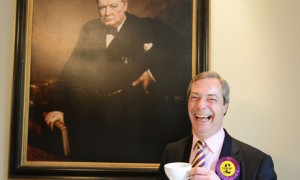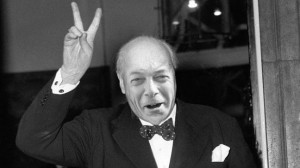“Our Nige”: The New Happy Warrior
N.B. A shorter version of this piece on Nigel Farage appeared in The Weekly Standard online

A few years ago Britain’s Nigel Farage was a political curiosity, head of a fringe party, gadfly member of the European Parliament, an ex-commodities broker who never went to college, dismissed as a nutter by ruling elites in London and Brussels. On 23 June 2016, he was widely credited with a key role in the referendum favoring Brexit— Britain’s exit from the European Community.
“Our Nige,” his supporters call him—personable, chatty, good-looking, beer swilling, cigarette and cigar smoking—wants Britain, not the European Union, to govern British affairs. To flip an uncertain quote from his hero Winston Churchill, he has all the vices they admire, and none of the virtues they despise. He also has the Churchillian habit of saying exactly what he thinks, regardless of polls, focus groups and the establishment.
Farage’s UK Independence Party (UKIP officially, “kippers” to critics) has been rolling like the nascent Labour Party a century ago, which displaced the Liberals and dominated political thought until Margaret Thatcher’s time. In 2014 UKIP turned 21 years old—Labour formed its first government at age 23.
In 2013’s local elections, kippers finished third. Last May, UKIP became the first party since 1906 to out-poll Labour and the Conservatives nationwide, winning 24 of Britain’s 73 seats in the rubber-stamp EU legislature.
This October UKIP elected its first member of Parliament, Douglas Carswell, and nearly ousted a Labour member in a “safe seat.” In November it’s likely to elect another MP. The party’s rising 25 percent in national polls—a political tsunami suggesting they may eventually hold the balance of power. [Since the Brexit vote, things haven’t gone very well for the party, so as of 2016 this was very much up in the air.]
Mr. Farage insists he isn’t against trade or immigration—he wants national control over them. “Right now, we have an open door to 485 million Europeans, and can’t make our own trade deals. Iceland, with 350,000 people, has a free-trade agreement with China. You’re telling me 63 million Brits can’t do such things?” He wants more trade with the “Anglosphere”: the U.S., India, and “the Commonwealth we so shamefully deserted.”
Nothing fazes Nige, a razor-sharp debater who jousts joyfully with the “ghastly” EU bureaucrats. The 2009 appointment of Herman Van Rompuy as “President of Europe” was just so much red meat: Instead of a giant global figure, Farage said, “all we got was you…And I don’t want to be rude, but you know, really, you have the charisma of a damp rag and the appearance of a low-grade bank clerk. And the question I want to ask is, Who are you?”
That earned him one of many fines, which, typically, he laughed off. “It’s been calculated that if I’m fined another 63 million times I personally will have paid the entire Euro bail-out fund.” A UKIP tea towel with Van Rompuy’s image proclaims, “genuine Belgian damp rag.”
UKIP has a libertarian agenda: lower taxes, an end to limitless debt and extremist environmentalism, drastic reductions in enterprise-stifling regulation, and no more military actions without a clue what the goal is: “What have we to show for our support of rebels in Libya, Syria, Egypt?” he asked American interviewer Lauren Lyster. “In Afghanistan and Iraq, we’re achieving, let’s be honest, nothing. I’m extremely tired of the UK joining overseas adventures where we never really think what the endgame’s going to be.”
With an understanding of reality American conservatives might emulate, Farage has learned that you can’t win big with a narrow base. He’s purged UKIP of extreme “full-mooners,” resisted the easy charge of racism. UKIP has an Indian-born Brit who says how hard it is to run a small business, a Caribbean-Brit who sounds like Adam Smith. Farage has a senior adviser named Raheem. In the 1980s there were Reagan Democrats; now in Britain there are Labour kippers.
Asked to advise Americans, Our Nige is careful: “I’m a guest in your country. [But] we both want personal liberty and the responsibility that goes with it. Yet your public finances are no better than the Eurozone’s.”
During the 2012 presidential debates he did venture what Romney might have said: “Look, Barack is a nice chap, but he’s proved he’s not up to the job. I have been successful in business….I’ve run a company, I’m the man you need…And let me tell you, it’s going to be tough. There’re going to have to be some very big cutbacks in the size of the state. But if you follow me, we’ll get this ship steady again.” One wonders if we’ll ever hear a U.S. politician campaign like that.

Of course he’s an easy target. “Farage makes me proud to be British,” wrote Alan Tyers on BT.com in May 2014. “UKIP’s popularity is testament to British tolerance. Where else would such half-baked views be granted so much airtime?” Four days later UKIP rolled up the European elections. People used to say such things about Ronald Reagan. And then…
The establishment parties are worried—“they’ve never held a job outside politics; they’re social-democrats, indistinguishable from each other”—and the media is digging. Recently, charges surfaced of Farage romancing a staffer—hotly denied by both. Then in October 2014, Farage’s “Europe of Freedom and Direct Democracy” (EFDD) Group in the European Parliament collapsed. EUP president Martin Schulz (“acting more like the president of a banana republic”) coerced the resignation of a key member and disbanded the group.
Undaunted, Farage replaced his loss and EFDD announced, “we’re back.” The new member was a Polish MEP from a right-wing party led by a Holocaust denier, though the man himself says Hitler was evil and deserved what he got. So it goes. Back on the offensive, Farage declared, “…this will be the last European Commission that governs Britain because within the end of this five years, we will be out of here.”
Clearly Nigel Farage is more than a blip on the radar now. How he handles his challenges may determine whether the EU revolt is real, and whether UKIP can redefine British politics.
But nobody who has seen him in action is counting him out.






